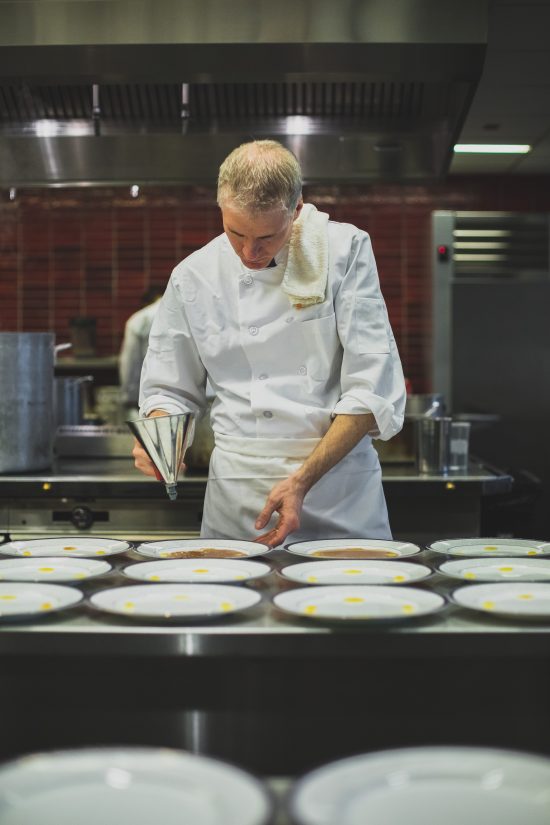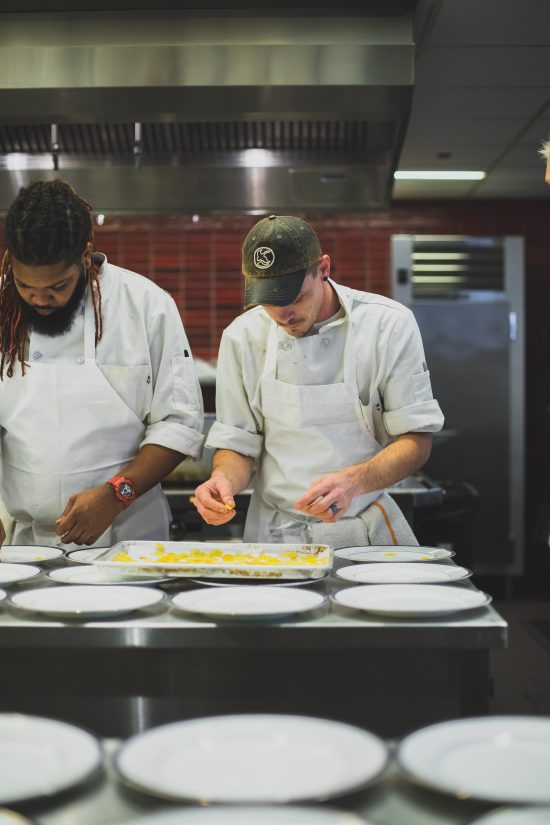Brandon Chrostowski is the founder and CEO of EDWINS Leadership and Restaurant Institute in Cleveland, Ohio, a restaurant and school that provides culinary training and job placement assistance to formerly incarcerated men and women. Everyone who works there, from the kitchen to the dining room, is a former inmate.

I met Brandon when he worked at my restaurant, Chanterelle, from late 2005 to 2008, starting as a server, and ultimately becoming an assistant general manager. He originally applied and interviewed with my wife, Karen, for a front of the house job. Though he had no dining room experience, he had been cooking for years in a number of excellent restaurants in the U.S. and France. He explained that he wanted to work with us to learn how the front of the house functions.
From the time Brandon began at Chanterelle, his goal was already to open a restaurant and school to help former inmates with re-entry and to teach them the skills needed to find work in the restaurant industry. I have remained a friend and supporter of Brandon and his project, so I was very happy to have been able to facilitate the dinner prepared by EDWINS at the James Beard House on January 17, 2018, which ICE generously allowed Brandon and his team to prep for in our kitchen classrooms. Brandon and EDWINS are also the subject of Thomas Lennon’s documentary “Knife Skills,” which was screened for students at ICE on January 18th and just received an Academy Award nomination for Documentary Short Subject.
Brandon took a moment from his busy visit to New York to chat with me about EDWINS and some other projects in the pipeline.
David Waltuck: How did you get your start in restaurants and cooking?
Brandon Chrostowski: I got involved after being arrested and then put on probation. I needed to find something that would keep me busy.
Did you have a mentor?
Yes. Chef George Kalergis, a Greek chef from Detroit. He taught me the fundamental techniques of classic restaurant cuisine and that it’s not practice that makes perfect but perfect practice that makes perfect.

When did you first conceive the idea that became EDWINS?
There were a series of events between 2002-2004 that led to the idea. I kept getting phone calls about people I knew who were killed or re-incarcerated. Also, the contrast of working in fine restaurants and living in poor areas always felt odd to me. I finally wrote a business plan in 2004.
Do you think the restaurant world is particularly accepting of people from varied backgrounds including incarceration? Why?
Yes. Because this industry accepts those who work hard and hard work has no language, and knows no boundaries when it comes to race, gender or ethnicity.
What is the success rate of your students? Do you have any favorite success stories?
Success is subjective. Each student has a life plan and if they make progress towards their goal then that is success — it’s not defined by what society deems success. As far as employment goes, after graduation our students find a job 95% of the time.
Recidivism, or rate of return [to prison], for EDWINS students is 1% — nationally, it is over 40%. As an organization, we’re seeing success in these areas for sure. We've seen students go on to incredible jobs, from three-star Michelin restaurants to restaurants in Normandy, France. Those are some fun stories to listen to!
What are your plans for the future in terms of EDWINS? Do you have any other projects in the pipeline?
We take it day by day. The first goal is to make sure we assist our students in accomplishing their goals. Next, it’s keeping the restaurant alive and sustainable. Running a school is expensive and unlike other schools, we pay students a stipend. It’s important to have a leaner, more profitable enterprise, in order to offset that cost. I’m also working on a butcher shop close to our campus.
The goal is to provide a place that focuses on butchery, charcuterie and preparation of meats. It’s also located in a neighborhood that has been forgotten and deserves a quality place to eat. And we can sell meats wholesale to the restaurant. Little by little we are trying to build the best culinary school in the states. Watch out ICE!
Want to study culinary arts with Chef David? Click here for information on ICE’s career programs.




